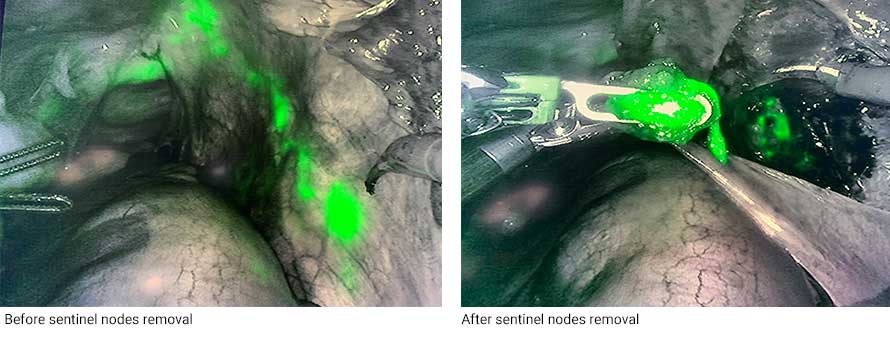
Endometrial Cancer: Routes of Surgery
There are many types of endometrial or uterine cancer treatment and a patient’s treatment plan may include one or more of these surgery options. Treatment varies from patient to patient and depends on factors such as the stage, size, and location of the tumor, as well as the characteristics of the individual patient.
The traditional approach to endometrial cancer surgery is called an exploratory laparotomy (a large open incision on the abdomen) with an abdominal hysterectomy and extensive removal of lymph nodes. This complex surgery is still used for patients who may have an enlarged uterus, an inability to tolerate the Trendelenburg position, or those with severe adhesion issues. When performing a laparotomy, our sub-specialty-trained and dual board-certified/eligible gynecologic oncologists can accurately diagnose and stage a tumor (extent of tumor spread), perform the hysterectomy, and assess whether additional therapy may be necessary.
Vaginal surgery is used on patients who are morbidly obese, elderly or those with medical comorbidities that preclude more extensive surgery.
Laparoscopy surgery is a newer technology that became popular in the 1990s. Some of the advantages of laparoscopy include smaller incision sites, shorter hospitalization, and a faster recovery with less discomfort.
The U.S. Food and Drug Administration approved the use of robotic gynecologic surgery for sentinel lymph node mapping in 2005. It has similar advantages to laparoscopy. Both laparoscopy and robotic surgery have oncologic outcomes that are equivalent, and both often have advantages over laparotomy for most patients.
Some advantages of robotic surgery for sentinel lymph node mapping include:
- Degrees of freedom (EndoWrist)
- Ergonomics
- Enhanced optics and visualization
- Decreased reliance on assistance
- Shortening of the learning curve
- Facilitating lymphatic mapping and staging
"Minimally invasive surgery should be embraced as the standard surgical approach for comprehensive staging in women with endometrial or uterine cancer," said Dr. Mitchel Hoffman, Vice Chair of the Department of Gynecologic Oncology.
In summary, women with endometrial cancer are managed primarily with surgery. Minimally invasive surgery is the standard approach. Sentinel lymphatic mapping with directed node dissection is appropriate and advantageous for most cases. However, the surgical approach must be individualized to provide the best outcome possible for the patient.

At Moffitt Cancer Center, our highly experienced gynecologic oncologists perform these endometrial cancer surgeries on a regular basis. Additionally, we specialize in advanced approaches to these procedures, performing laparoscopic and robot-assisted surgeries when applicable. By offering a range of innovative approaches to endometrial cancer surgery, we’re able to recommend the most promising options for each patient’s needs. A multispecialty team of gynecologic oncologists will assess each patient’s unique situation to determine the best treatment options possible.
If you’d like to refer a patient to Moffitt Cancer Center, complete our online form or contact a physician liaison for assistance. As part of our efforts to shorten referral times as much as possible, online referrals are typically responded to within 24 - 48 hours.
